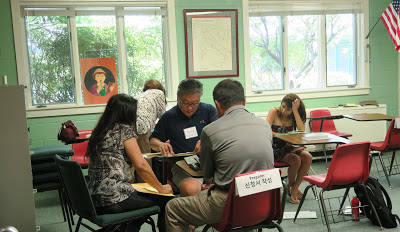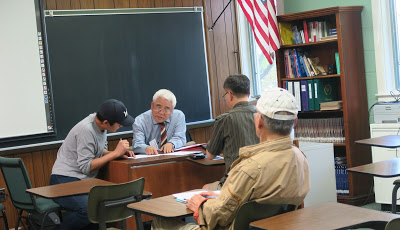Korean organizations help immigrants attain citizenship
 |
| Volunteers help immigrants fill out the naturalization form. |
A coalition of Korean organizations helped dozens of people apply for naturalization at a free citizenship clinic at the Westminster School in Annandale June 18.
More than 50 people, not all of them Koreans, had signed up in advance for the event hosted by the New Americans Civic Engagement Alliance. There were also a fair number of walk-ins.
 |
|
| The naturalization form is complicated. |
Volunteers helped immigrants, many of them not proficient in English, fill out the U.S. Citizenship and Immigration Services’ 20-page application for naturalization and apply for waivers of the $680 application fee.
Some of the volunteers were attorneys, but “we’re not here to provide legal advice, just to help with the application,” said Marianne Brackney, president of the Korean American Women’s Society (KAWS) and one of the organizers of the event.
“There’s a strong need in the Korean and Asian communities for people to become naturalized,” said Dong Yoon Kim, program director in the Annandale office of the National Korean American Service & Education Consortium (NAKASEC). “The lack of citizenship is a barrier to getting a better job, getting better benefits, and being able to vote and travel more freely,” he said, and “citizenship would also end the fear of deportation.”
While the upcoming presidential election has put a spotlight on immigration issues – and there’s always a concern that immigration laws could change – that’s not the driving force for most Korean immigrants seeking citizenship, Kim said. They are mostly motivated by economic factors.
People who apply now aren’t likely to achieve citizenship by Election Day anyway. It takes about one or two hours to fill out the naturalization application and can take up to a week to gather all the needed documents, he said. After filing, it takes two to six months to receive a naturalization certificate. After that, there’s an interview and applicants have to pass a basic civics test.
“Sadly enough, it’s a test that many Americans born here would likely fail,” Kim said.
He estimates there are 8,000 to 10,000 Korean Americans in the D.C. metropolitan area eligible for naturalization.
In addition to KAWS and NAKASEC, the other members of the New Americans Civic Engagement Alliance include Asian-American Homeownership Counseling, Bethel Senior Center, Central Senior Center, the Annandale-based Korean American Association of Washington Metropolitan Area, Korean American Society of Virginia, Korean Society of Maryland, and Korean Seventh Day Adventist Church.

